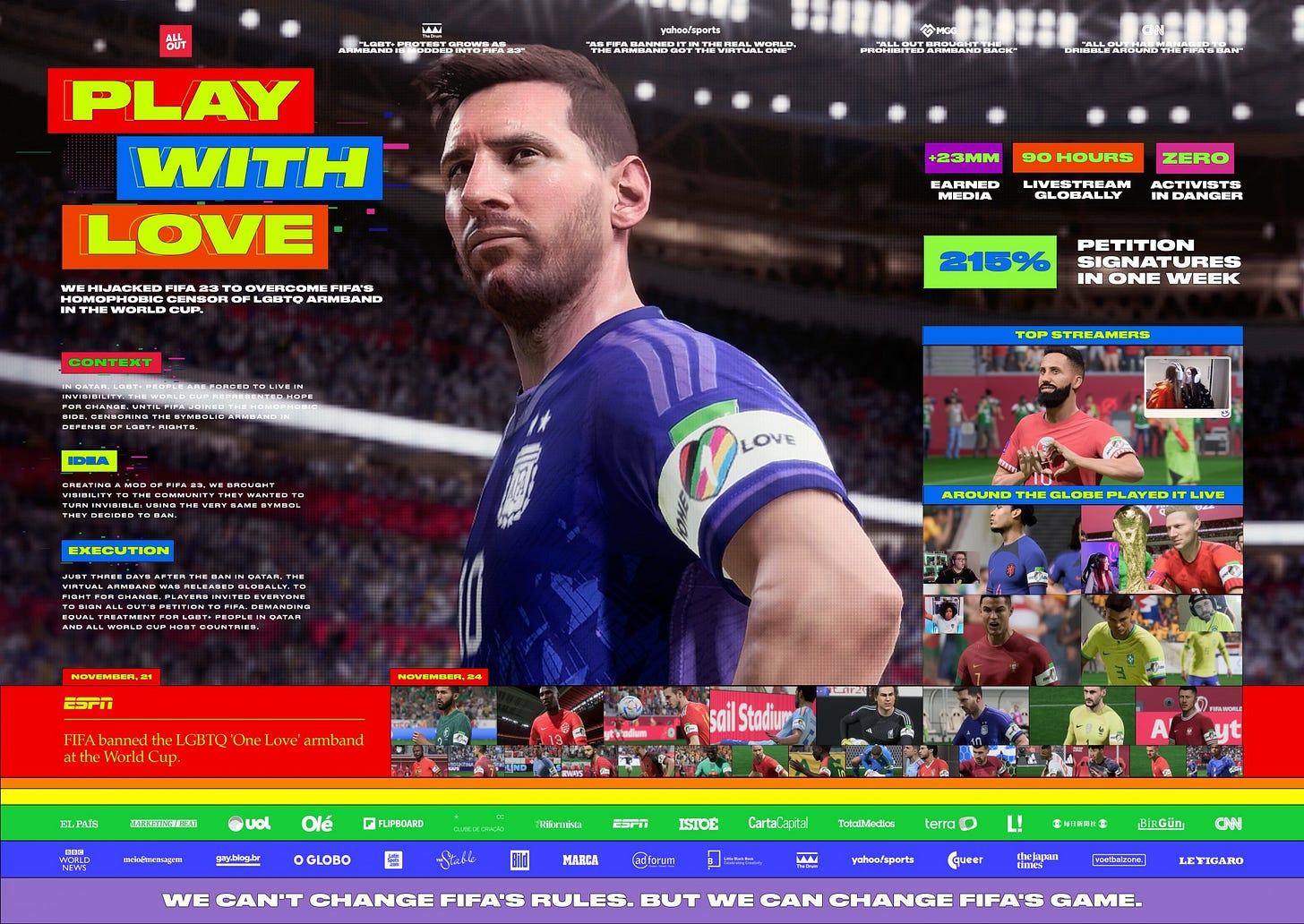Exactly one year ago today, the men's World Cup kicked off and it gave people everything. It gave the naysayers every reason to justifiably hate it. And it gave all football lovers a spectacle to remember.
But it also gave one of the best finals in the history of football, if not the best.
A final, I must say, that I thoroughly enjoyed. Until the 80th minute. From then on I spent it lying on the floor in unbearable anguish until Gonzalo Ariel Montiel, did as the mermaid with whom he shares a middle name, put on some magic legs, and put an end to Argentina's 36 years without a World Cup title.
Today I bring you six creative ideas that were launched on the occasion of the Qatar World Cup and were awarded at the Cannes Lions advertising creativity festival.
Most of these ideas are from Argentina, proving that winning a World Cup is not just about raising the fees of the players.
The Forgotten Team (MEO + Amnesty).
Portuguese mobile telecommunications company MEO teamed up with Amnesty to give visibility to the tragedy of the workers who died during the construction of some of the stadiums for the World Cup.
Although it reminds me a lot of Amnesty's Refugee Nation, what I like about this idea is that it makes the call for workers' human rights tangible.
It also leaves a bitter taste in my mouth to see that, only one year later, this demand has been completely forgotten.
Public displays of encouragement (Apple).
We are going to make as big a leap as En-Nesyri against Portugal and move from such a dramatic subject as the previous one to a more comical one together with Apple and Ted Lasso.
Despite the successes of the women's national team and more than 25 years of MLS, in terms of communication, the United States couldn't get out of the first phase. That is, to communicate football/soccer as something epic, legendary, where anything can happen.
Until Ted Lasso came along and added nuances to the storytelling and gave rise to a campaign that aims more at the intimate than the grandiloquent. A campaign that teaches Americans to love football (soccer) more for what it does indoors than for what it can give at the international level.
Eat like a champ (PedidosYa).
Unlike Americans, Argentines feel comfortable diving into the nuances and micro-stories of the world of football.
In this case, PedidosYa, a food delivery app, decided that the stars of its World Cup campaign would not be the footballers, but the local clubs in which the footballers played when they were kids. Or, to be more precise, the bars of these clubs.
I have the feeling that, in this case, they had the idea and then looked for what problem it could solve. It's not ideal, but sometimes it works.
World Cup Delivery (PedidosYa).
While we're on the subject of PedidosYa, I'd like to share their other World Cup idea that won an award at Cannes Lions. In this case, with much more impact.
This action is striking for its simplicity, for its perfect use of the medium and for having known how to make the most of a moment that had the attention of the whole country.
It's one of those ideas so simple, but so good, that you say "why didn't I think of that?".
Coincidences (Quilmes).
We continue in the country of Messi, Maradona, Kempes and Cásserly with this idea from Quilmes Beer that was awarded in Cannes because Argentina won the World Cup.
It's a good idea, with a good insight and a good execution, but it wouldn't have been complete without the trophy.
Looking for coincidences is as Argentinean as being afraid to mix wine with watermelon. For example, recently Boca Juniors of Argentina went into the final of the Copa Libertadores hoping to win it for the seventh time. For the entire month leading up to the final, fans were busy finding matches to the last achievement (in 2007) and saw the number 7 everywhere. Even the players added their own coincidences. But, in the end, Boca lost and their coincidences were gone with the wind. What a pity!
In the case of Quilmes, the World Cup ended up making the idea better, the insight more powerful and the execution more superb. Luckily for them, for the 40 million Argentines, for the 170 million Bangladeshis and for millions of football and Messi fans.
Play with Love (All Out).
We open and close with the great controversies of Qatar. In this case, linked to homophobia.
With the World Cup already underway, FIFA decided to ban the One Love captain's armband, which bore the LGTBIQ+ flag and which some teams were planning to use. There were tensions, but in the end FIFA managed to enforce Qatar's wishes and no captain wore a rainbow-coloured armband.
Without the visibility of the World Cup, All Out tried to take advantage of the media noise to bring the armband to the FIFA game so that the captains of all 32 teams could be seen wearing the iconic colours in Qatar.
Clearly the impact was not the same, but All Out's effort to not sit idly by and find a creative way to give visibility to their message is to be commended.



